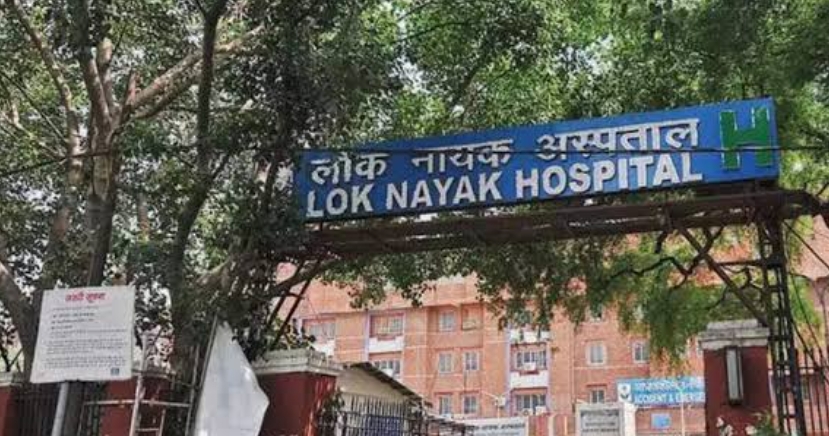
Cold wave: Delhi hospitals see spike in respiratory cases; drop seen next week
Doctors in the capital talk to The Federal about the kind of health issues people can be exposed to during winter and what they can do stay healthy. Asthma patients and people with persistent cough for many days also need to take care

As the prolonged cold wave condition and deteriorating air quality envelops Delhi, both the government and private hospitals are witnessing a spike in respiratory illnesses with some, like the elderly with co-morbidities requiring emergency care.
However, doctors say that the footfall in city hospitals is likely to reduce post January 15, as the prevailing cold spell subsides.
What happens during an extended cold spell?
People are often exposed to all kinds of health problems during an extended cold spell. Speaking to The Federal, Dr Shipra Anand, pulmonologist and assistant professor at Lok Nayak Hospital said: “Prolonged exposure to cold and dry air worsens existing respiratory conditions and leads to new cases of weather-induced asthma. The harsh weather also contracts blood vessels in the heart and blocks arteries, causing improper blood flow and heart-related problems and ultimately triggering a heart attack.”
During winters, the heart has to work harder to maintain a healthy body temperature. “It is important for people to protect themselves by exercising regularly and checking their blood pressure, cholesterol and blood sugar at regular intervals,” advised Dr Anand.
Also read: Fog continues to shroud Delhi-NCR, flights delayed
Talking about how a prolonged cold wave can be fatal for asthma patients, doctors at the All India Institute of Medical Sciences said asthma involves inflammation in the airways, which may worsen during winter, and cause symptoms like breathlessness and coughing. The condition of existing asthma patients may worsen if they do not take proper measures against the cold.
Why symptoms are persisting for long
There’s the issue of people suffering with a persistent nagging cough for days. Dr Tarun Sahni, senior consultant in medicine, Apollo Hospital agreed that this year particularly the symptoms triggered by respiratory issues are persisting in patients for a longer time.
Dr Sahni told The Federal that every year during winters, due to a combination of three or four factors – a spurt in pollution levels, incidents of viral infection, falling temperatures, the hospitals see a rise in the number of patients visiting hospitals with respiratory issues. “But this year, the symptoms are persisting in patients as compared to previous years. This may be due to our waning immunity, as we have experienced an extended pandemic,” explained Dr Sahni.
A persistent long winter increases respiratory issues and the trend begins post Diwali, when air quality starts deteriorating. The pollutants tend to remain for a longer period clearly leading to the persistence of airway inflammation, pointed out Dr Sahni.
Also read: Cold wave, dense fog continue to batter Delhi, north India; flights, trains hit
Why normal medication is not working
Replying to a question on why people are not responding to normal medication, he said, normal cough does not cause spasm or acute bronchitis, but some of the cases of extended cough is due to constriction in chest similar to what happens in asthma, therefore requiring a different medication. “Normal cough syrups act as suppressant, but in cases which we are seeing now, one needs syrups with expectorant and bronchodilator. With a changed dosage, patients will feel much better,” said Dr Sahni, adding that they have 50-60 patients suffering from respiratory issues visiting their hospital every week.
Increasing number of cases
Dr Siddharth Raj Yadav, assistant professor, department of pulmonary medicine, Vallabhbhai Patel Chest Institute, too said that they have seen a massive spike in patients with respiratory issues at the OPD. But, according to the doctor, the patients thankfully are responding to medicines, and there are no severe cases reported in their hospital until now.
“Mostly we have elderly patients with co-morbidities and young people whose work entails travelling. I was tending to about 100 patients a day in the beginning of January, however, the number has slightly dropped in the last two days. I am confident that the number of cases will decrease significantly as the cold spell subsides,” said Dr Raj Yadav.
IMD statement
Meanwhile, the Indian Meteorological Department in a statement said frostbite can occur due to prolonged exposure to cold and that one should not ignore shivering – the first sign that the body is losing heat. “Eat vitamin C-rich fruits and vegetables and drink sufficient warm fluids to maintain adequate immunity. Avoid or limit outdoor activities,” the readout mentioned.
The IMD has also said cold wave conditions are very likely in isolated pockets over Delhi and its neighbouring states from Saturday. Light rainfall in the national capital might bring some respite from extreme temperatures for a few days.


